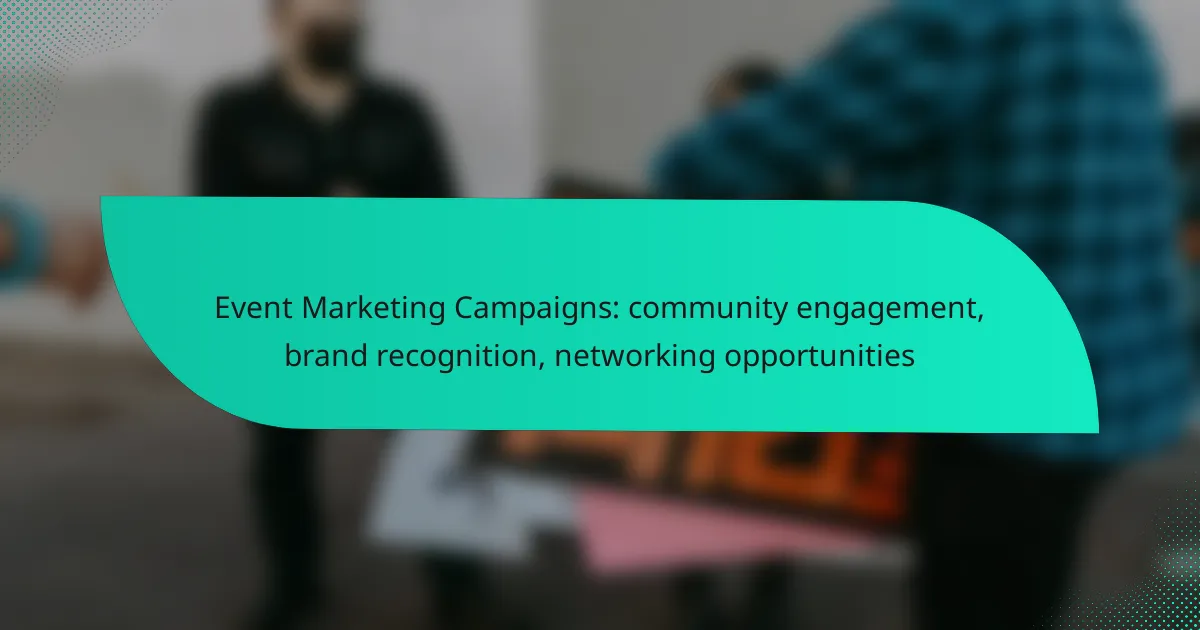Event marketing campaigns play a crucial role in enhancing community engagement by connecting local residents with businesses and fostering meaningful interactions. By creating memorable experiences and a strong visual identity, these campaigns not only boost brand recognition but also provide valuable networking opportunities for attendees. This collaborative environment encourages the sharing of ideas and the establishment of professional relationships, paving the way for future partnerships.

How can event marketing campaigns enhance community engagement in London?
Event marketing campaigns can significantly boost community engagement in London by fostering connections between local residents and businesses. These campaigns create opportunities for interaction, collaboration, and shared experiences that strengthen community ties and enhance brand recognition.
Local partnerships with community organizations
Building partnerships with local organizations is essential for successful event marketing in London. Collaborating with schools, charities, and cultural institutions can help attract diverse audiences and create a sense of shared purpose. For instance, co-hosting events with a local charity can enhance credibility and draw in community members who are passionate about the cause.
Consider reaching out to organizations that align with your brand values. This can lead to mutually beneficial arrangements, such as sponsorships or joint marketing efforts, which can amplify your reach and impact.
Interactive workshops and activities
Offering interactive workshops and activities during events can significantly enhance community engagement. These hands-on experiences allow participants to learn new skills or explore topics of interest, making the event more memorable. For example, hosting a cooking class or art workshop can attract local residents eager to participate and connect with others.
Ensure that activities cater to various age groups and interests to maximize participation. Providing incentives, such as giveaways or discounts for future events, can also encourage attendance and engagement.
Social media engagement strategies
Utilizing social media effectively can amplify your event marketing efforts and enhance community engagement in London. Create event-specific hashtags to encourage attendees to share their experiences online. This not only increases visibility but also fosters a sense of community among participants.
Engage with your audience before, during, and after the event by posting updates, sharing behind-the-scenes content, and responding to comments. Consider running contests or polls to encourage interaction and gather feedback, which can help improve future events.
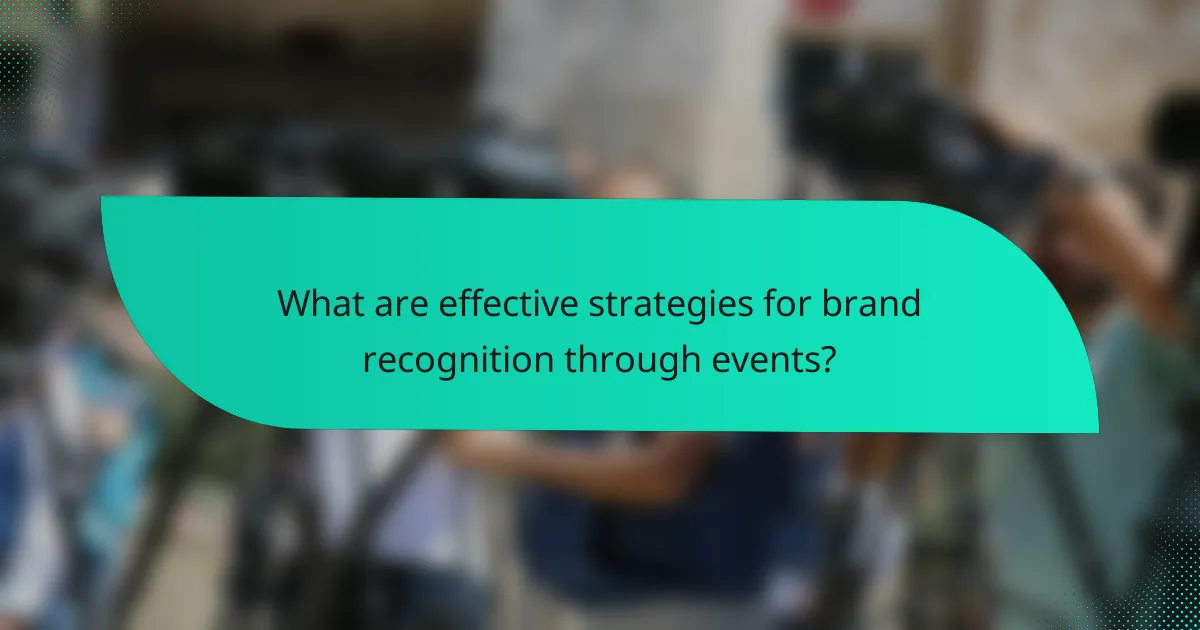
What are effective strategies for brand recognition through events?
Effective strategies for brand recognition through events include creating a strong visual identity, engaging attendees with memorable experiences, and fostering connections through networking. These approaches help to enhance visibility, build brand loyalty, and encourage word-of-mouth promotion.
Utilizing branded merchandise
Branded merchandise serves as a tangible reminder of your event and brand. Items like t-shirts, mugs, and tote bags can effectively increase brand visibility when attendees use them post-event. Aim for high-quality products that resonate with your audience to ensure they are valued and used frequently.
Consider offering a variety of merchandise options to cater to different preferences, such as eco-friendly items or tech gadgets. This not only enhances brand recognition but also aligns with the values of your target demographic.
Creating memorable experiences
Memorable experiences at events can significantly boost brand recognition by creating emotional connections with attendees. Interactive activities, immersive environments, and engaging presentations can leave a lasting impression. For instance, incorporating live demonstrations or unique entertainment can captivate your audience and encourage them to share their experiences online.
Design your event flow to include moments that surprise and delight attendees. This could be through unexpected giveaways, personalized interactions, or unique themes that reflect your brand’s identity. The more engaging the experience, the more likely attendees will remember and advocate for your brand.
Leveraging influencer collaborations
Collaborating with influencers can amplify your brand’s reach and credibility during events. Influencers can attract their followers to your event, enhancing visibility and engagement. Choose influencers whose values align with your brand and who have a genuine connection with their audience to ensure authenticity.
Consider hosting influencer-led sessions or meet-and-greet opportunities at your event. This not only draws their followers but also creates shareable content that can extend your brand’s reach beyond the event itself. Be sure to provide influencers with clear guidelines to maintain your brand’s messaging and image.
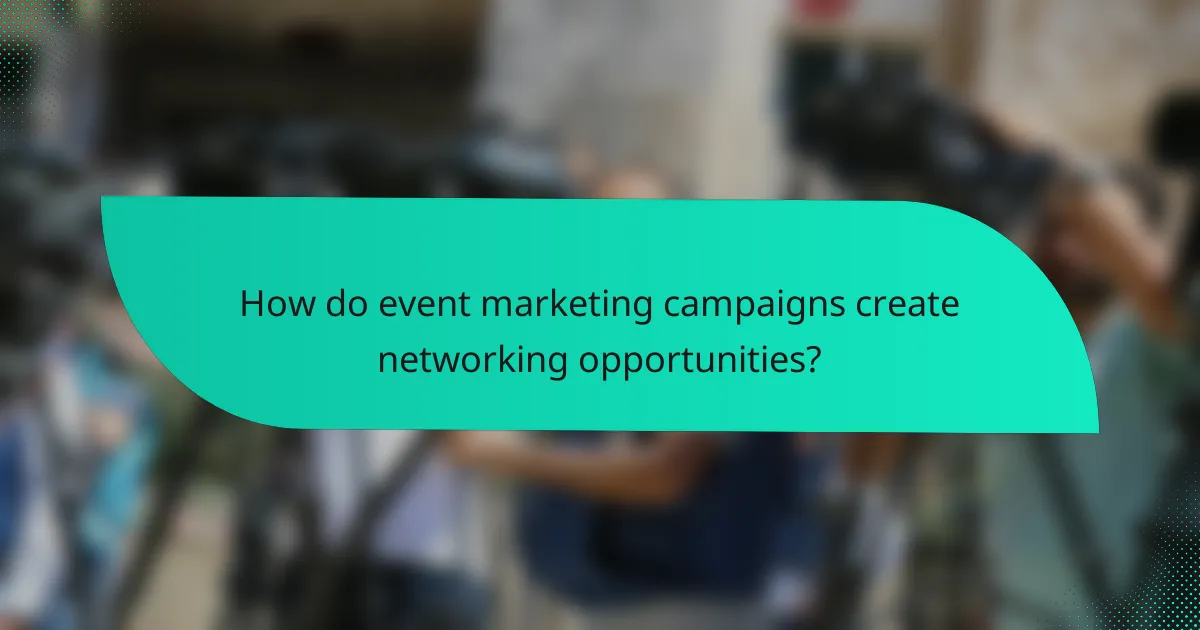
How do event marketing campaigns create networking opportunities?
Event marketing campaigns create networking opportunities by bringing together individuals from similar industries or interests, allowing for meaningful connections. These events foster an environment where attendees can share ideas, collaborate, and establish professional relationships that can lead to future partnerships or business ventures.
Facilitating industry-specific meetups
Industry-specific meetups are designed to gather professionals from a particular sector, enhancing the relevance of networking opportunities. These gatherings often include panel discussions, workshops, or informal meet-and-greets that focus on current trends and challenges within the industry.
For example, a technology conference may host meetups for software developers, allowing them to connect over shared experiences and explore potential collaborations. This targeted approach increases the likelihood of forming valuable connections that can benefit attendees’ careers.
Offering structured networking sessions
Structured networking sessions provide a framework for attendees to interact in a more organized manner. These sessions often include icebreakers, speed networking, or roundtable discussions that encourage participants to engage with one another effectively.
By setting specific time limits for conversations or guiding discussions around particular topics, structured sessions help break down barriers and facilitate connections among attendees who might otherwise remain isolated. This method can lead to more productive interactions and meaningful exchanges.
Utilizing event apps for connections
Event apps enhance networking by allowing attendees to connect before, during, and after the event. These applications often feature profiles, messaging capabilities, and scheduling tools that make it easier for participants to find and engage with others who share similar interests or goals.
For instance, an event app might allow users to filter attendees by industry or expertise, enabling targeted outreach. Additionally, features like in-app messaging can facilitate conversations that continue beyond the event, helping to solidify new connections and collaborations.
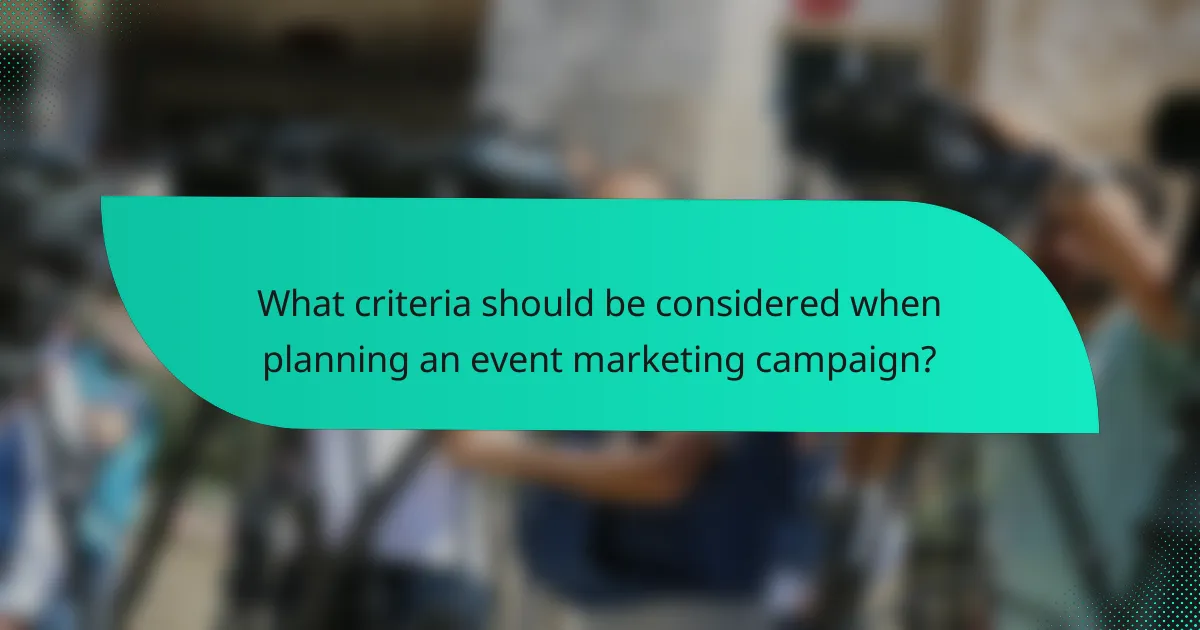
What criteria should be considered when planning an event marketing campaign?
When planning an event marketing campaign, it is crucial to consider factors such as target audience, budget, and sponsorship opportunities. These elements significantly influence the campaign’s effectiveness and overall success.
Target audience identification
Identifying the target audience is essential for tailoring the event marketing campaign to meet their interests and needs. Consider demographics such as age, location, and profession, as well as psychographics like values and lifestyle preferences.
Utilize surveys, social media insights, and market research to gather data on potential attendees. This information will help in crafting messages that resonate and in selecting platforms for promotion that reach the intended audience effectively.
Budget allocation and sponsorship
Budget allocation is a critical aspect of event marketing, determining the scope and scale of the campaign. Establish a clear budget that covers venue costs, marketing materials, and promotional activities, while also leaving room for unexpected expenses.
Consider seeking sponsorships to enhance your budget. Approach local businesses or relevant brands that align with your event’s theme, offering them visibility in exchange for financial support. This can significantly reduce costs while increasing brand recognition for both parties.
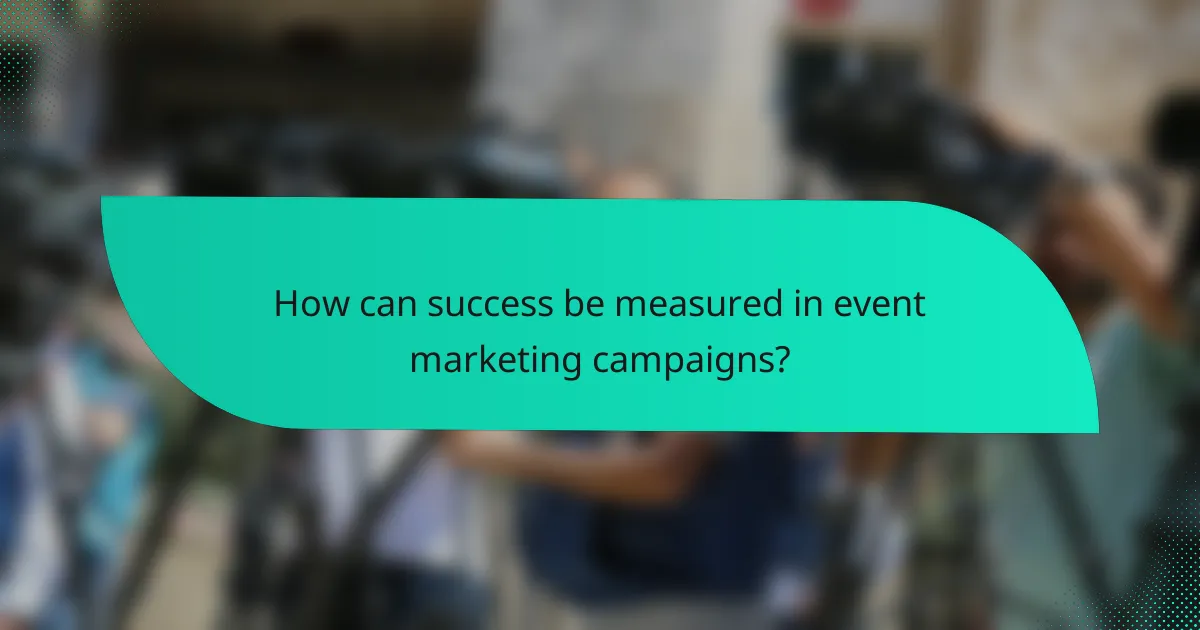
How can success be measured in event marketing campaigns?
Success in event marketing campaigns can be measured through various metrics that reflect community engagement, brand recognition, and networking opportunities. Key indicators include attendee feedback, social media engagement, and lead generation, which provide insights into the effectiveness of the campaign.
Attendee feedback and surveys
Collecting attendee feedback through surveys is essential for understanding participant satisfaction and areas for improvement. Surveys can be distributed immediately after the event or via follow-up emails, asking questions about the overall experience, content relevance, and networking opportunities.
Consider using a mix of quantitative and qualitative questions to gather comprehensive insights. For example, a scale of 1 to 5 for satisfaction can be paired with open-ended questions for detailed comments. Aim for a response rate of at least 20-30% to ensure the feedback is representative.
Social media engagement metrics
Social media engagement metrics are crucial for gauging brand recognition and community interaction during and after an event. Track likes, shares, comments, and mentions across platforms like Facebook, Twitter, and Instagram to assess the campaign’s reach and impact.
Utilize tools like Google Analytics or social media analytics dashboards to analyze engagement trends. A good benchmark is to aim for a 5-10% engagement rate on posts related to the event, indicating that the content resonated with your audience.
Lead generation tracking
Lead generation tracking is vital for measuring the effectiveness of networking opportunities provided at the event. This can be done by monitoring the number of new contacts collected, sign-ups for newsletters, or inquiries generated during the event.
Implement a clear system for capturing leads, such as using QR codes for digital sign-ups or business card collection. Aim for a conversion rate of around 10-20% from attendees to qualified leads to evaluate the success of your networking efforts.

What emerging trends are shaping event marketing in the UK?
Emerging trends in event marketing in the UK include the rise of hybrid formats and a growing emphasis on sustainability. These trends are reshaping how brands engage with communities, enhance recognition, and create networking opportunities.
Hybrid event formats
Hybrid event formats combine in-person and virtual experiences, allowing broader participation. This approach caters to diverse audiences, enabling those who cannot attend physically to engage online, thus expanding reach and engagement.
When planning hybrid events, consider technology requirements, such as reliable streaming services and interactive tools. Ensure that both in-person and virtual attendees have opportunities to network and participate actively, which may involve using dedicated platforms for interaction.
Increased focus on sustainability
There is a significant shift towards sustainable practices in event marketing, driven by consumer demand for eco-friendly initiatives. Brands are increasingly adopting strategies that minimize waste, such as digital tickets and sustainable materials for event setups.
To implement sustainability in your events, consider options like local sourcing for catering, reducing single-use plastics, and promoting carbon offset programs. Engaging attendees in sustainability efforts can enhance brand image and foster community support.
